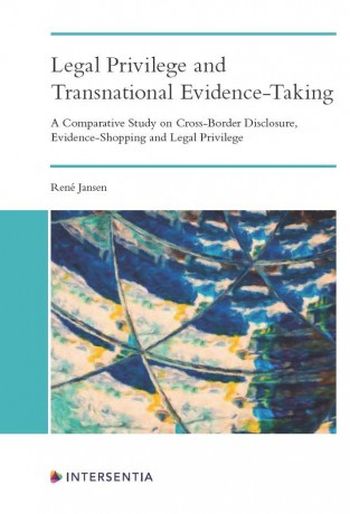We will be closed from 5pm Thursday 17th April for the Easter Bank Holidays, re-opening at 8.30am on Tuesday 22nd April. Any orders placed during this period will be processed when we re-open.

There are various methods for taking evidence abroad during litigation. This work focuses on two of them: 1. obtaining legal documents from a foreign national adversarial party during the main proceedings (‘cross-border disclosure’), and 2. obtaining documents with the help of an auxiliary court, with the aim of introducing them as evidence during foreign civil proceedings (‘evidence shopping’). It has a particular focus on the situation where a party wants to inspect information that their opponent has confidentially shared with a foreign (in-house) lawyer.
In such instances, various questions arise. May the court grant the disclosure order based on the procedural law of its state? If so, how should the court determine the applicable law regarding possible legal privilege? Will this be the rules of its own state, or should the court apply a foreign state’s rules on legal privilege instead? And does it make a difference whether the applicant requests disclosure during the main proceedings, or considering civil proceedings that will take place abroad?
This book discusses these questions regarding the U.S. federal, English, French, German and Dutch legal systems.
It inter alia argues that the Hague Evidence Convention and the EU Evidence Regulation do not prevent a court from compelling a litigant to disclose a document in violation of a foreign state’s laws. Furthermore, it demonstrates that in each of the examined legal systems, courts, in principle, have the authority to grant such a disclosure order, and that most of these courts appear to apply the legal privileges of their state when the requested information has been shared with a foreign (in-house) lawyer. This book also shows that various courts use an alternative rule for determining the applicable law on legal privilege.
Having outlined in which of the examined legal systems an applicant might be able to shop for evidence in light of a foreign civil procedure – that might enable them to obtain information that is not discoverable according to the laws of the state where the main proceedings take place – the book proceeds with explaining the differences between the legal systems’ rules on legal privilege. In doing so, it brings to light instances where an applicant could strategically try to obtain information that is solely privileged from disclosure on the basis of a foreign state’s rules on legal privilege.
The book concludes by proposing a new rule that courts should use for determining the applicable legal privilege law in such cases.